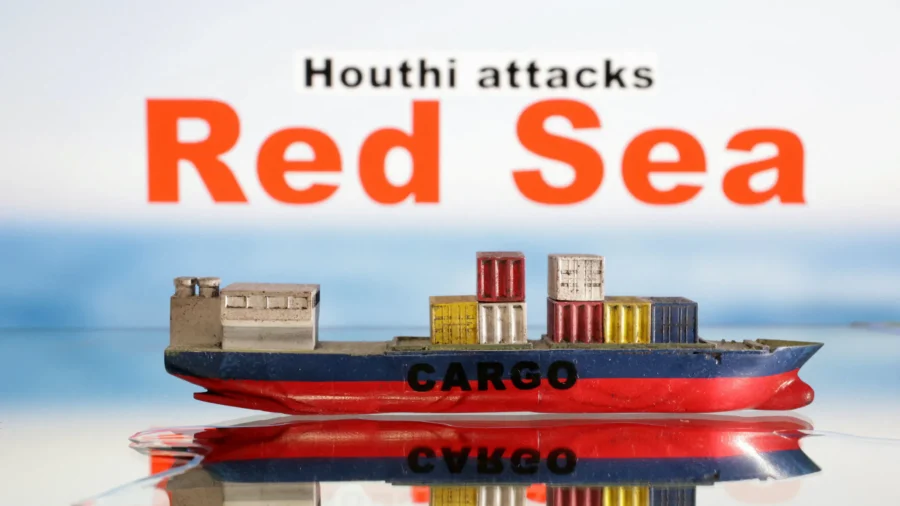Unrest in the Red Sea continues as Yemen’s Houthi terrorists persist in their attacks against cargo ships in the waterway. The Houthis most recent attack on Feb. 22 saw two missiles being fired at a British-owned cargo vessel, causing a fire to break out on board.
According to reports by Britain’s maritime agencies, the attack occurred off the southeast coast of the Yemeni city of Aden.
British maritime security firm Ambrey confirmed the vessel as a Palau-flagged cargo ship bound for the Red Sea from Thailand.
The United Kingdom Maritime Trade Operations (UKMTO) agency said the attack happened roughly 70 nautical miles from Aden. The attack prompted a response from U.S.-led coalition forces, although the agency provided no additional information.
“It has been reported that a vessel was attacked by two missiles, resulting in a fire on board,” the UKMTO said.
It has been more than three months since the Iran-backed Houthi terrorist group started its attacks on shipping in the Red Sea and its surrounding waterways. The group is in control of much of Yemen’s most populous regions.
The Houthis have vowed to target vessels with a clear affiliation to Israel, in their attempts to persistently attack vessels to cause disruption for one of the world’s major shipping routes, as the war in Gaza continues.
However, despite saying that only those ships with clear links to Israel would be targeted, the terrorists repeatedly struck vessels that had no clear affiliation or had tenuous links to Israel.
As a result of the disruption caused by the Houthis to commercial shipping, many firms have resorted to taking safer, albeit longer and more expensive routes around the African continent.
Apart from driving up commercial prices on goods due to the elevated costs the companies are faced with, the recent attacks have sparked concerns that Israel’s military action in Gaza could have wider implications, thus creating more instability in the whole Middle-Eastern region and potentially having a serious impact on the price of oil, a resource abundant in multiple Arab nations.
However, according to the U.S. State Department, the Houthis’ attacks are doing absolutely nothing to help those in Palestine, which the group claims they are trying to help.
“Many of the ships that the Houthis have attacked contained food, such as grain and corn, headed for [Sudan, Ethiopia, and Yemen itself],” according to a Feb. 21 press release.
“Contrary to what the Houthis may attempt to claim, their attacks do nothing to help the Palestinians. Their actions are not bringing a single morsel of assistance or food to the Palestinian people,” the press release went on to say.
Recent attacks by the terrorist group saw three commercial vessels attacked between Feb. 16 and Feb. 19. One of those ships was the Sea Champion, which was bringing corn and other food supplies to the Yemeni people in Aden and to Hudaydah.
In addition to the trade disruption caused by the Houthis, Lebanon’s Hezbollah terrorist movement has frequently exchanged fire across the border with Israel, while other pro-Iranian terrorist groups have attacked U.S. forces in Iraq.
The United States has formed an international coalition to protect maritime navigation in the Red Sea in response to the Houthi attacks.
Reuters contributed to this article.


